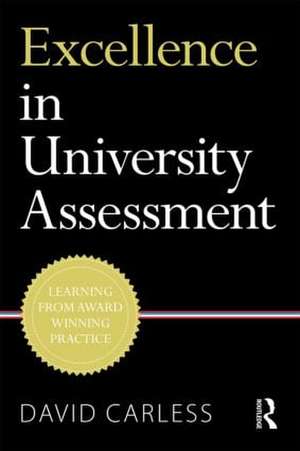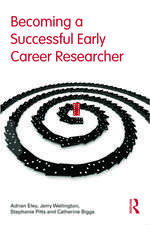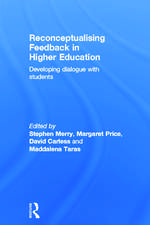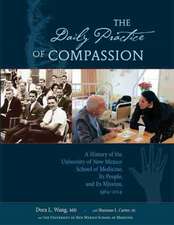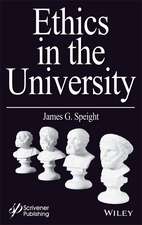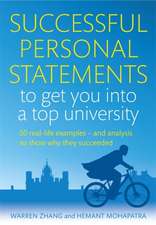Excellence in University Assessment: Learning from award-winning practice
Autor David Carlessen Limba Engleză Paperback – 24 apr 2015
The book uses an innovative model of learning-oriented assessment to analyze the practice of university teachers who have been recipients of teaching awards for excellence. It critically scrutinizes their methods in context in order to develop key insights into effective teaching, learning and assessment processes. Pivotal topics include:
- Competing priorities in assessment and ways of tackling them;
- The nature of quality assessment task design;
- The student experience of assessment;
- Promoting student engagement with feedback.
An indispensable contribution to assessment in higher education, Excellence in University Assessment is a valuable guide for university leaders, middle managers, staff developers, teachers and researchers interested in the crucial topic of assessment.
| Toate formatele și edițiile | Preț | Express |
|---|---|---|
| Paperback (1) | 387.49 lei 6-8 săpt. | |
| Taylor & Francis – 24 apr 2015 | 387.49 lei 6-8 săpt. | |
| Hardback (1) | 1004.55 lei 6-8 săpt. | |
| Taylor & Francis – mai 2015 | 1004.55 lei 6-8 săpt. |
Preț: 387.49 lei
Nou
Puncte Express: 581
Preț estimativ în valută:
74.15€ • 77.61$ • 61.71£
74.15€ • 77.61$ • 61.71£
Carte tipărită la comandă
Livrare economică 01-15 aprilie
Preluare comenzi: 021 569.72.76
Specificații
ISBN-13: 9781138824553
ISBN-10: 1138824550
Pagini: 282
Ilustrații: 3 black & white illustrations, 8 black & white tables, 3 black & white line drawings
Dimensiuni: 156 x 234 x 15 mm
Greutate: 0.41 kg
Ediția:1
Editura: Taylor & Francis
Colecția Routledge
Locul publicării:Oxford, United Kingdom
ISBN-10: 1138824550
Pagini: 282
Ilustrații: 3 black & white illustrations, 8 black & white tables, 3 black & white line drawings
Dimensiuni: 156 x 234 x 15 mm
Greutate: 0.41 kg
Ediția:1
Editura: Taylor & Francis
Colecția Routledge
Locul publicării:Oxford, United Kingdom
Public țintă
Academic, Postgraduate, Professional, and Professional Practice & DevelopmentCuprins
Section A: Learning and Assessment
Introduction: Setting the scene
Chapter 1: Competing priorities in assessment
Chapter 2: Researching learning-oriented assessment
Section B: Designing and implementing assessment tasks
Chapter 3: Promoting student engagement with assessment tasks
Chapter 4: Assessment task design in History
Chapter 5: Learning-oriented assessment in Law
Chapter 6: Group assessment and participation in Geology and Business
Section C: Engaging with quality criteria
Chapter 7: Promoting student engagement with quality
Chapter 8: Engaging with criteria in History and Geology
Chapter 9: Critical reviews in Architecture
Section D: Reconceptualising feedback and ways forward
Chapter 10: Promoting student engagement with feedback
Chapter 11: Feedback processes in the cases
Chapter 12: Conclusions and ways forward for learning-oriented assessment
References
Author Index
Subject Index
Introduction: Setting the scene
Chapter 1: Competing priorities in assessment
Chapter 2: Researching learning-oriented assessment
Section B: Designing and implementing assessment tasks
Chapter 3: Promoting student engagement with assessment tasks
Chapter 4: Assessment task design in History
Chapter 5: Learning-oriented assessment in Law
Chapter 6: Group assessment and participation in Geology and Business
Section C: Engaging with quality criteria
Chapter 7: Promoting student engagement with quality
Chapter 8: Engaging with criteria in History and Geology
Chapter 9: Critical reviews in Architecture
Section D: Reconceptualising feedback and ways forward
Chapter 10: Promoting student engagement with feedback
Chapter 11: Feedback processes in the cases
Chapter 12: Conclusions and ways forward for learning-oriented assessment
References
Author Index
Subject Index
Notă biografică
David Carless is Professor of Educational Assessment and Associate Dean (Learning and Teaching) in the Faculty of Education, University of Hong Kong.
Recenzii
"Overall, the book theoretically contributes to our understanding of the learning aspects of assessment that help resolve competing priorities of assessment. The discussion of learning-oriented assessment in contexts and from student and teacher perspectives as well as its presentation in a manner of ‘‘coherent scholarship’’ (Carless 2015) enhances the quality of the book...Carless’s book definitely encourages academies in higher education that believe in the role of assessment in supporting learning but do not know how to realize such a role for assessment in classrooms."- Ying Zhan, Guangdong University of Foreign Studies, Higher Education
"This book is an authoritative voice on assessment. David Carless explores all aspects of assessment, from specific design methods to reduce the likelihood of plagiarism to an exploration of the psychological impact of marks on students' sense of self. This is an interesting book, with one of its significant strengths being the wide reference to a plethora of different research" - Sally Burr, University of Sussex, Educational Developments
"It is important to have a high-profile book on assessment, as assessment has been relatively overlooked in comparison to learning and teaching. This book emphasizes the importance of integrating assessment as a central element within learning and teaching." - Maddalena Taras, University of Sunderland, London Review of Education
‘The author is well known and respected in assessment in higher education. He is visible at international conferences and in the peer-reviewed literature and has a secure and deep understanding of the field.’ David Boud, University of Technology, Sydney
‘A major strength is the learning-oriented focus to assessment that Carless has previously developed and which he extends in this proposal. Unlike many books on assessment, the approach adopted is well-founded conceptually and the examples will be located within an overall framework that goes beyond the particularities of the examples.
Elements that would make this volume a unique or essential resource: The unique feature of the book is the emphasis on award winning teachers and what they do. A very important feature is the use of real examples of assessment practice drawn from clearly identified good practice.’ David Boud, University of Technology, Sydney
‘I would anticipate this book would be very appealing to a range of stakeholders in the UK, given the recent national focus on learning & teaching enhancement (due to increasing impact of NSS, interest in the status of teaching --with professional standing becoming a HESA return-- and gathering impetus for assessment reform). The author frequently visits the UK to deliver conference presentations, talks and keynotes and his publications are frequently cited in the area of assessment in HE. In consequence, he is already well-known and his clear, lucid approach, which teases out strong recommendations, appeal to a wide audience/market (practitioners at the chalk face, course teams, managers with responsibility for enhancement, staff and educational developers, as well as researchers and those with a specialist interest in assessment matters).’ Kay Sambell, Northumbria University
‘A sole authored monograph from a high profile researcher that makes use of empirical data as exemplars for good practice. The structure is logical and the sample chapter contains abundant references including recent sources. The model of learning-orientated assessment that is developed is useful because it emphasises the tensions between the different roles assessment processes are expected to fulfil.
Elements that would make this volume a unique or essential resource: The distinctiveness of the publication is outlined above. While aspects of particular case studies from the author’s research of award-winning tutors have been previously included in specific academic publications, this is the first time to my knowledge that the study as a whole has been presented so enabling the findings considered from a variety of perspectives. I would anticipate that interested researchers will know of the author’s work and so are likely to want to read more. Furthermore, the focus on tutors’ practice mentioned below may serve to make this volume particularly attractive to university managers and those on postgraduate teaching courses.’ Stephen Merry, Staffordshire University
"This book is an authoritative voice on assessment. David Carless explores all aspects of assessment, from specific design methods to reduce the likelihood of plagiarism to an exploration of the psychological impact of marks on students' sense of self. This is an interesting book, with one of its significant strengths being the wide reference to a plethora of different research" - Sally Burr, University of Sussex, Educational Developments
"It is important to have a high-profile book on assessment, as assessment has been relatively overlooked in comparison to learning and teaching. This book emphasizes the importance of integrating assessment as a central element within learning and teaching." - Maddalena Taras, University of Sunderland, London Review of Education
‘The author is well known and respected in assessment in higher education. He is visible at international conferences and in the peer-reviewed literature and has a secure and deep understanding of the field.’ David Boud, University of Technology, Sydney
‘A major strength is the learning-oriented focus to assessment that Carless has previously developed and which he extends in this proposal. Unlike many books on assessment, the approach adopted is well-founded conceptually and the examples will be located within an overall framework that goes beyond the particularities of the examples.
Elements that would make this volume a unique or essential resource: The unique feature of the book is the emphasis on award winning teachers and what they do. A very important feature is the use of real examples of assessment practice drawn from clearly identified good practice.’ David Boud, University of Technology, Sydney
‘I would anticipate this book would be very appealing to a range of stakeholders in the UK, given the recent national focus on learning & teaching enhancement (due to increasing impact of NSS, interest in the status of teaching --with professional standing becoming a HESA return-- and gathering impetus for assessment reform). The author frequently visits the UK to deliver conference presentations, talks and keynotes and his publications are frequently cited in the area of assessment in HE. In consequence, he is already well-known and his clear, lucid approach, which teases out strong recommendations, appeal to a wide audience/market (practitioners at the chalk face, course teams, managers with responsibility for enhancement, staff and educational developers, as well as researchers and those with a specialist interest in assessment matters).’ Kay Sambell, Northumbria University
‘A sole authored monograph from a high profile researcher that makes use of empirical data as exemplars for good practice. The structure is logical and the sample chapter contains abundant references including recent sources. The model of learning-orientated assessment that is developed is useful because it emphasises the tensions between the different roles assessment processes are expected to fulfil.
Elements that would make this volume a unique or essential resource: The distinctiveness of the publication is outlined above. While aspects of particular case studies from the author’s research of award-winning tutors have been previously included in specific academic publications, this is the first time to my knowledge that the study as a whole has been presented so enabling the findings considered from a variety of perspectives. I would anticipate that interested researchers will know of the author’s work and so are likely to want to read more. Furthermore, the focus on tutors’ practice mentioned below may serve to make this volume particularly attractive to university managers and those on postgraduate teaching courses.’ Stephen Merry, Staffordshire University
Descriere
Assessment is an area of intense growing interest in higher education and as a result of its centrality to student learning has become a central part of the curriculum. This book is a pioneering text, which contributes to the theory and practice of assessment through detailed discussion and analysis of award-winning approaches, inspiring higher-education practitioners to improve their own practice.
The book uses a model of learning-oriented assessment to analyse the practice of university teachers who have been awarded for excellence in teaching, and critically scrutinizes these practices in order to develop key insights into key aspects of highly effective teaching, learning and assessment processes.
The book uses a model of learning-oriented assessment to analyse the practice of university teachers who have been awarded for excellence in teaching, and critically scrutinizes these practices in order to develop key insights into key aspects of highly effective teaching, learning and assessment processes.
